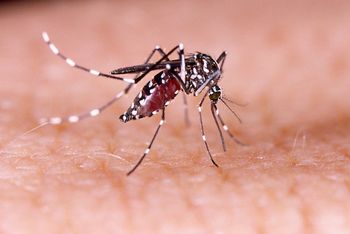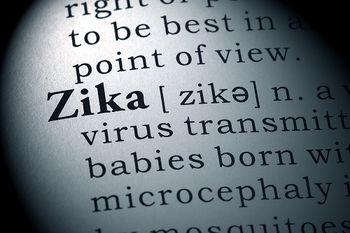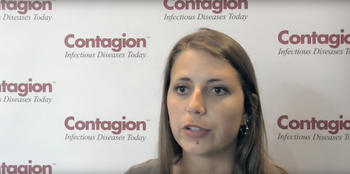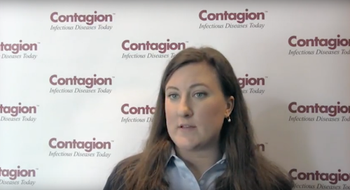
Carmen Zorrilla, MD, professor of obstetrics and gynecology, University of Puerto Rico, School of Medicine, explains her study which stress, depression, and anxiety levels in pregnant women in Puerto Rico with and without Zika infection.

Carmen Zorrilla, MD, professor of obstetrics and gynecology, University of Puerto Rico, School of Medicine, explains her study which stress, depression, and anxiety levels in pregnant women in Puerto Rico with and without Zika infection.

At The First International Zika Conference, Lenore Pereira, PhD, discussed her research regarding the question of how Zika virus is able to spread from maternal blood to the placenta to reach the fetus.

At the First International Zika Conference, Viviane S. Boaventura, MD, PhD, researcher, Fiocruz-Bahia, Gonçalo Moniz Institute, Brazil, presented her research that depicting an association between Congenital Zika Syndrome and hearing loss.

At the First International Zika Conference, Dr. Bogoch, professor of Emergency Medicine at Boston University School of Medicine, chairman at Replikins LLC, Foundation for Research on the Nervous System, explained how Replikins can give advanced warning of outbreaks and their cessation.

Lenore Pereira, PhD, professor of Cell and Tissue Biology at University of California, San Francisco, discusses how Zika crosses the placenta.

Annelies Wilder-Smith, MD, PhD, professor at Lee Kong Chian School of Medicine in Singapore, discusses why the Zika virus outbreak in Singapore did not reach such large proportions as those that occurred in the Americas.

At the First International Conference on Zika Virus, Alice Panchaud, PharmD, PhD, clinical pharmacist and pharmacoepidemiologist, CHUV, Lausanne University Hospital, Switzerland, discussed how an international registry can help estimate the risk of Zika virus associated with birth defects and abnormal pregnancy outcomes.

On Friday, February 24, 2017, at the First International Conference on Zika Virus, Matthew Aliota, PhD, discussed the Eliminate Dengue Program.

Viviane Boaventura, MD, PhD, researcher, Fiocruz-Bahia, Gonçalo Moniz Institute, Brazil, discusses her research regarding impaired hearing function due to congenital Zika syndrome.

Alice Panchaud, PharmD, PhD, clinical pharmacist and pharmacoepidemiologist, CHUV, Lausanne University Hospital, Switzerland, explains how data sharing may be used to answer important questions regarding congenital Zika syndrome.

Both Zika-infected and uninfected pregnant women showed levels of high stress in a recent study conducted in Puerto Rico.

Matthew Aliota, PhD, research scientist, University of Wisconsin, Pathobiological Sciences, explains why the mechanism behind how Wolbachia blocks Dengue virus transmission is not yet fully understood.

At the First International Conference on Zika Virus, Marta G. Cavalcanti, MD, PhD, discussed her team’s recent research regarding viral RNA shedding in symptomatic and asymptomatic Zika patients who are either mono-infected with Zika or Chikungunya, or co-infected with both.

At the First International Zika Conference, keynote speaker Annelies Wilder-Smith, MD, PhD, DTM&H, MIH, FAMS, FACTM, discussed how Zika has evolved on a global scale.

Marta G. Cavalcanti, MD, PhD, physician at Infectious Diseases Clinic, Hospital Universitario Clementino Fraga Filho, UFRJ, Brazil, discusses how the period of RNA shedding correlates with the severity of complications associated with mono- or coinfection in Zika patients.

Contagion® will be attending the conference, so keep a look out for session coverage, as well as interviews with some of the key presenters.

Madeline King, PharmD, assistant professor of Clinical Pharmacy at the University of the Sciences, Philadelphia College of Pharmacy in Philadelphia, Pennsylvania, discusses her research on the efficacy of ceftazidime-avibactam against infections caused by gram-negative organisms.

Madeline King, PharmD, assistant professor of Clinical Pharmacy at the University of the Sciences, Philadelphia College of Pharmacy in Philadelphia, Pennsylvania, explains for which infections ceftazidime-avibactam is approved by the US Food and Drug Administration.

Michael D. Nailor, PharmD, BCPS-AQ ID, clinical associate professor at the University of Connecticut School of Pharmacy, clinical specialist in infectious diseases at Hartford Hospital, and director of Infectious Disease Residency program at Hartford Hospital, explains how his research can assess clinical well-being of patients with skin and soft tissue infections.

Megan Luther, PharmD, Advanced Health Services research fellow, Providence Veterans Affairs Medical Center, University of Rhode Island, College of Pharmacy, discusses potential strategies to reduce incidence of acute kidney injuries due to vancomycin and pip/tazo combination therapy.

Oluwatoyin (Toyin) Adeyemi, MD, attending physician of infectious diseases, at Cook County Health and Hospital System, discusses the next steps in implementing activities for the CORE Healthy Aging Initiative.

Michael D. Nailor, PharmD, BCPS-AQ ID, clinical associate professor at the University of Connecticut School of Pharmacy, clinical specialist in infectious diseases at Hartford Hospital, and director of Infectious Disease Residency program at Hartford Hospital, discusses the clinical significance of the results of his study on readmission rates among patients with skin and soft tissue infections.

Monique Foster, MD, MPH, EIS officer, Division of Viral Hepatitis, Centers for Disease Control and Prevention (CDC), discusses the CDC’s HCV universal birth cohort testing program.

Michael D. Nailor, PharmD, BCPS-AQ ID, clinical associate professor at the University of Connecticut School of Pharmacy, clinical specialist in infectious diseases at Hartford Hospital, and director of Infectious Disease Residency program at Hartford Hospital, explains that resources for skin and soft tissue infections need to be directed at emergency departments.

Megan Luther, PharmD, Advanced Health Services research fellow, Providence Veterans Affairs Medical Center, University of Rhode Island, College of Pharmacy, discusses alternative therapies to the acute kidney injury-causing combination of vancomycin piperacillin/tazobactam.

Monique Foster, MD, MPH, EIS officer, Division of Viral Hepatitis, Centers for Disease Control and Prevention, explains that hepatitis C infection awareness has been on the rise in the United States.

Michael D. Nailor, PharmD, BCPS-AQ ID, clinical associate professor at the University of Connecticut School of Pharmacy, clinical specialist in infectious diseases at Hartford Hospital, and director of Infectious Disease Residency program at Hartford Hospital, explains why it’s important to understand the prevalence of skin and soft tissue infections.

Oluwatoyin (Toyin) Adeyemi, MD, attending physician of infectious diseases, at Cook County Health and Hospital System, discusses the CORE Healthy Aging Initiative (CHAI).

Monique Foster, MD, MPH, EIS officer, Division of Viral Hepatitis, Centers for Disease Control and Prevention, discusses the importance of new medications to treat hepatitis C.

Michael D. Nailor, PharmD, BCPS-AQ ID, clinical associate professor at the University of Connecticut School of Pharmacy, clinical specialist in infectious diseases at Hartford Hospital, and director of Infectious Disease Residency program at Hartford Hospital, discusses the biggest challenges associated with classifying and treating skin and soft tissue infections.